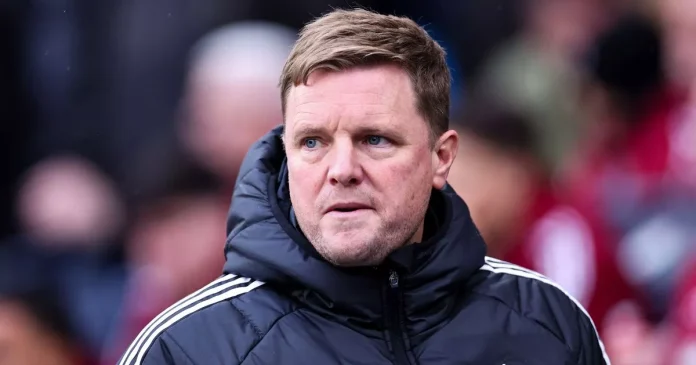Newcastle United manager Eddie Howe is currently in hospital, where he is being treated for pneumonia. The 47 year old was admitted on Friday after feeling unwell for a number of days and was unable to attend St James’ Park for the Premier League game on Sunday afternoon.
A statement from the Premier League confirmed: “Newcastle United can announce that Eddie Howe is recovering in hospital after being diagnosed with pneumonia. The club continues to extend its best wishes and support to Eddie and his family as he continues his recovery. Get well soon, gaffer.”
Howe issued a statement of his own following the club’s announcement. “A huge thank you to everyone connected with Newcastle United and the wider football community for your messages and warm wishes. They have meant a lot to me and my family,” he said.
“I also want to pay tribute to our incredible NHS and the hospital staff who have treated me. I’m immensely grateful for the specialist care I’m receiving and, after a period of recovery, I look forward to being back as soon as possible.”
Pneumonia is inflammation of the lungs, usually caused by an infection. According to the NHS, most people get better in two to four weeks, but babies, older people, and people with heart or lung conditions are at risk of getting seriously ill and may need treatment in hospital. Symptoms of pneumonia can start suddenly or gradually over a few days.
They include:
However, the NHS recommends asking for an urgent GP appointment or get help from NHS 111 if you’ve had a cough for three weeks or more, you’re coughing up blood, you have chest pain that comes and goes, or happens when breathing or coughing or you’re feeling short of breath.
Pneumonia is usually treated with antibiotics, and most people start to feel better within two to four weeks. However, some individuals are at higher risk of developing serious complications and may need hospital care. You might be admitted to the hospital if:
In the hospital, treatment typically includes antibiotics and fluids to fight the infection. Oxygen may also be given to help with breathing. Doctors may also perform a chest X-ray and blood tests to look for any other underlying issues.
There are several vaccines available to help protect you or your child from infections that can cause pneumonia, including the pneumococcal vaccine, flu vaccine, RSV vaccine and the COVID-19 vaccine. Stopping smoking also reduces your chance of getting pneumonia.
At Reach and across our entities we and our partners use information collected through cookies and other identifiers from your device to improve experience on our site, analyse how it is used and to show personalised advertising. You can opt out of the sale or sharing of your data, at any time clicking the “Do Not Sell or Share my Data” button at the bottom of the webpage. Please note that your preferences are browser specific. Use of our website and any of our services represents your acceptance of the use of cookies and consent to the practices described in our Privacy Notice and Cookie Notice.


